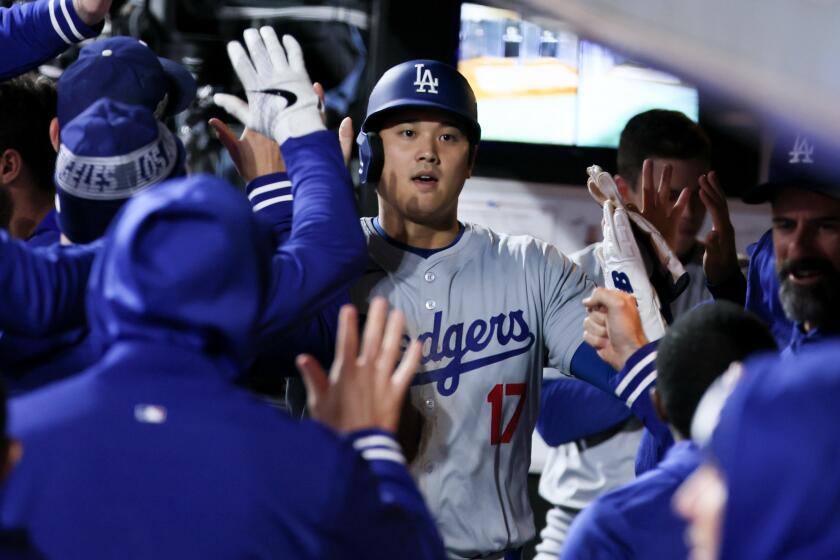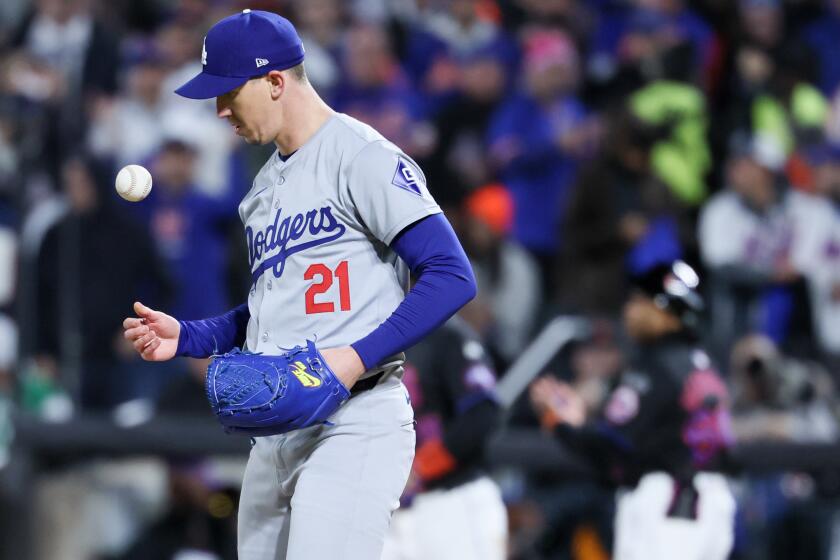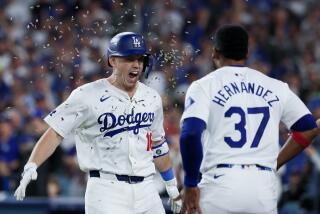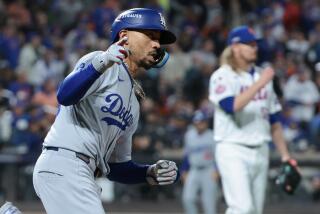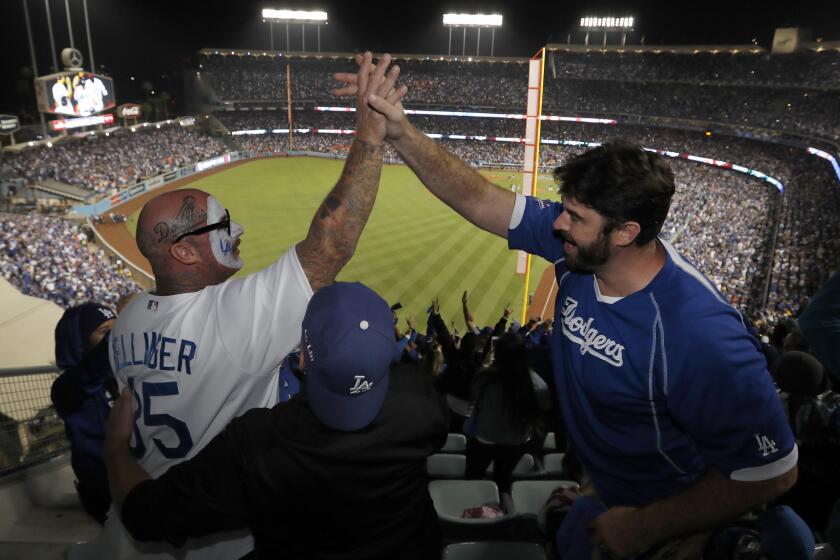
NEW YORK — When the Dodgers dug into their lineup’s playoff problems at the end of last season, they noticed a strange October trend.
Teams that swung freely at the plate seemed to advance more often in recent postseasons. More disciplined clubs like the Dodgers, on the other hand, tended to flame out.
It was an observation that stuck with some Dodgers hitters, third baseman Max Muncy among them, over another long winter.
“There was definitely some talks about it,” Muncy recalled Thursday.
In the end, however, the Dodgers came to a different conclusion entering this postseason, deciding not to change their mindset in October, but rather refine the patient approach that has become a staple of their dominance.
It’s happening, a done deal, a mortal lock, prepare for tickets, plan for parties, spread the word, the Dodgers are going to advance to the World Series.
“It’s being aggressive on balls in the zone, not taking balls in the zone, and not swinging out of the zone,” Muncy explained, a task easier said than done. “I think that’s just a deeper understanding for us, understanding who we are as a team.”
And over the last couple of weeks, Muncy proudly added, “We’ve had an entire lineup being able to buy into that.”
On Thursday night at Citi Field, the Dodgers might have provided the best example yet, blowing away the New York Mets with a 10-2 win in Game 4 of the National League Championship Series.
Just as they preached in their pregame hitters meeting, the club grinded out at-bats (recording 12 hits), took walks when they needed (drawing nine, plus a hit batter) and mashed their way to their highest-scoring postseason performance since Game 5 of the 2021 NLCS, finishing the night with seven more runs than any other club in this postseason.
Now, they have the ultimate opportunity: a 3-1 lead in the best-of-seven series and a chance to win the pennant — and clinch a World Series berth — in Game 5 at Citi Field on Friday.

“I’m very excited to be in this position,” manager Dave Roberts said. “And I just want to keep our guys hungry and focused, and not let these guys back in the series.”
While the star of this Dodgers run has been their shutdown bullpen — which followed Yoshinobu Yamamoto’s two-run, 4⅓-inning start with 4 ⅔ more scoreless innings — the offense quietly has turned the page from its recent postseason struggles.
Entering the playoffs, the Dodgers had failed to eclipse five runs in six straight playoff games. Thursday was the sixth time in nine games they’ve done it this month, leading the playoffs in batting average (.243), on-base-plus-slugging percentage (.750) and home runs (15) among clubs that advanced past the wild-card round.
“It’s just belief in each other,” outfielder Teoscar Hernández said. “If they don’t want to pitch to one guy, then the next guy is ready. And if they don’t want to pitch to that guy, then the next guy is ready to do their part. It’s not about you getting the big hit. It’s just about getting good at-bats for the guy behind you.”

Added utility man Tommy Edman: “Everybody’s just doing well up and down the lineup.”
That had not been the case in past postseasons, when the Dodgers’ star hitters went missing and their lineup failed to punish mistakes or work consistent at-bats. In the previous two postseasons, the Dodgers tallied only 23 walks to 67 strikeouts.
But in an October all about redemption, this team has made resounding amends.
“We’re only worried about this postseason,” said first baseman Freddie Freeman, who missed Game 4 because of his sprained ankle but expects to be back in the lineup for Game 5. “We’ve been executing our plans every single day.”
Walker Buehler isn’t the same pitcher he once was, and he showed that based on how he got out of a critical jam in Game 3 of the NLCS against the Mets.
Much of the production has come from the long ball, including a leadoff shot from Shohei Ohtani two pitches into the game and a two-run drive from Mookie Betts that put things away in the sixth.
In between that, however, the Dodgers built a couple of big innings, sticking to their patient plan against Mets left-hander José Quintana.
Entering Game 4, Quintana had been on a late-season tear fueled mostly by making hitters chase pitches. In the regular season, he threw only 44% of his pitches in the strike zone, the lowest rate among qualified starters. On Thursday, the Dodgers wanted to turn that game plan against him.
“Tonight was a battle of who was going to give in first,” Muncy said. “He wanted to get us to chase. We wanted to get him to throw strikes. And it was just who was going to be more stubborn. And I feel like we were able to outlast him.”
Indeed, Quintana was forced to throw 83 pitches in just 3⅓ innings, giving up five runs. In 20 of their first 30 at-bats, the Dodgers managed to work at least two balls in the count. They waited for mistakes. Then pounced when they arrived.
The Dodgers scored twice in a third inning that featured two walks, setting up Edman for an RBI double and Kiké Hernández for an RBI single.
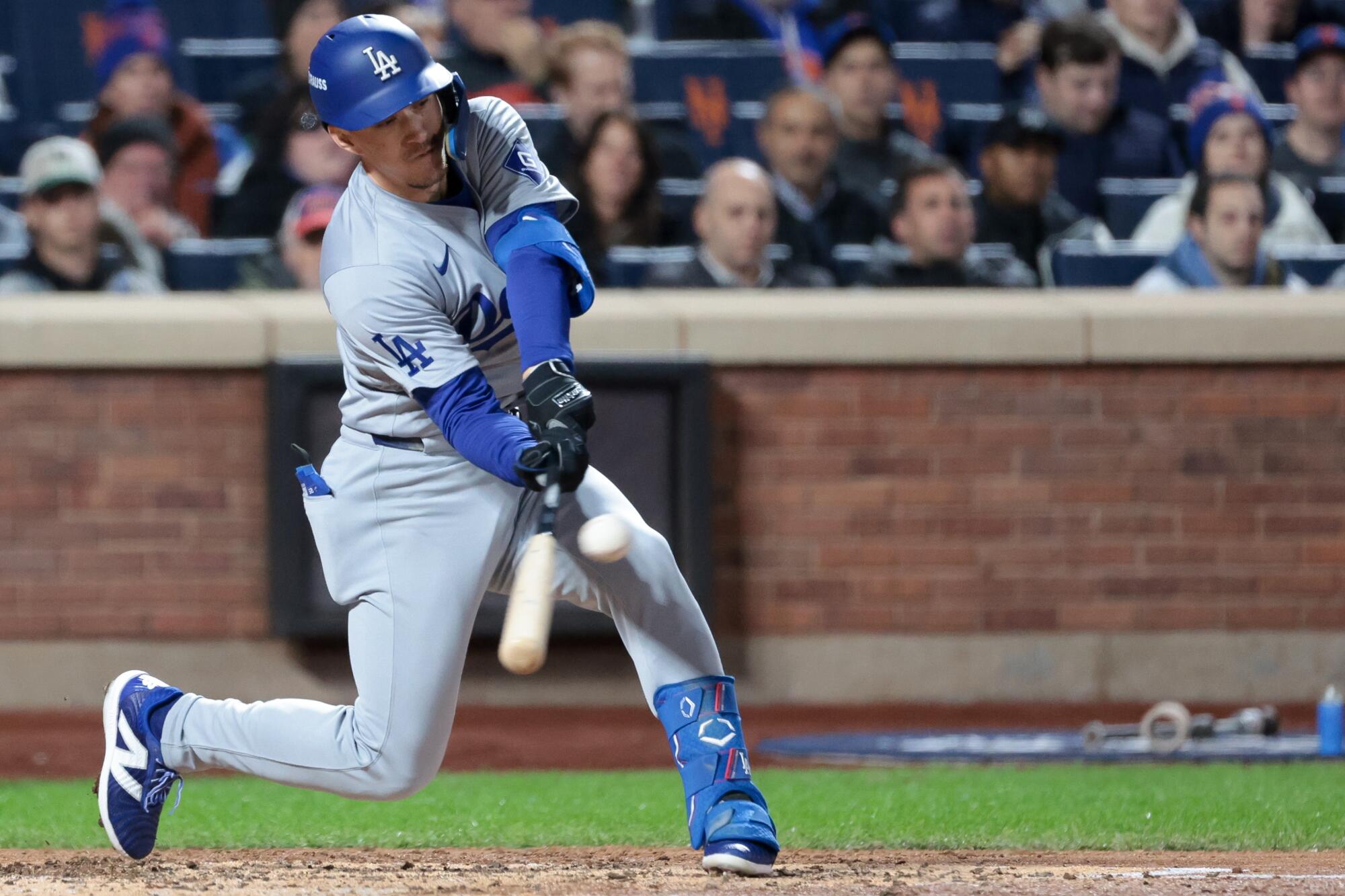
More runs came in the fourth, when Betts roped a two-run double to left — part of his postseason career-high four RBIs — following a full-count single from Chris Taylor and full-count walk by Ohtani.
“Guys are just competing every pitch,” Taylor said. “One through nine, everybody is putting up good ABs.”
The night added to a string of staggering Dodgers statistics, from the 44 walks they have drawn this postseason — including 31 in this series, the most by any team over a four-game postseason stretch in history — to their 18 two-out RBIs and a .329 batting average with runners in scoring position.
“When you have plans and you stick to them,” Freeman said, “most of the time they’re going to work out.”
Fittingly, it is Muncy who has best embodied the Dodgers’ meticulous approach of late.
He entered Thursday having reached safely in eight consecutive trips to the plate, then set a postseason record by running the streak to 12 with three walks in the first five innings and a single in the seventh.
“The most important thing is, that means I’m getting on base, giving my teammates a chance to drive me in, creating havoc, doing anything I can,” Muncy said, unaware of the record until after the game.

Ohtani has followed suit.
This week Roberts noted that the slugger had been expanding the zone too often early in the playoffs, having struck out more times (12) than he had reached safely (11) in his first seven postseason games. Since then, Ohtani has gotten aboard in six of his 11 trips to the plate, including three walks Thursday after his first-inning home run.
Then there’s Edman, quietly making a case for the NLCS most valuable player award. Batting cleanup, he followed his third-inning double with a two-run two-bagger in the eighth. His seven hits in the series lead the team, while his seven RBIs are tied with Betts for most.
“I felt like I kind of just did my job today,” Edman said. “Tried to have good at-bats, and had a couple opportunities to get some runners in and was able to cash in.”
That’s the motto that has transcended the lineup this month; principles forged from past postseason failures helping the Dodgers reach the doorstep of the Fall Classic.
“Up and down the lineup, we’re just staying within ourselves, having a good approach, and not trying to do too much in the box,” Muncy said. “When we have an entire group of guys that are buying into that mindset, then it becomes pretty special.”
More to Read
Are you a true-blue fan?
Get our Dodgers Dugout newsletter for insights, news and much more.
You may occasionally receive promotional content from the Los Angeles Times.

